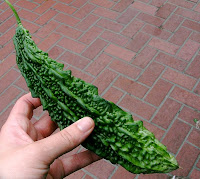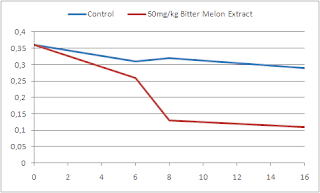A Bitter Pill For Your Testes: Purported Health Supplement Bitter Melon Induces Oxidative Damage in Rat Testes and Reduces Testosterone Levels by >50%
 |
| Image 1: Momordica charantia, also known as Bitter melon - just in case you haven't seen this remarkable fruit yet. (photo FlyingToaster) |
In a recently published study, Yama, et al. (Yama. 2011) investigated the effect of 6-16 weeks of 50mg/kg (human equivalent: 8mg/kg) Momordica charantia (bitter melon) seed extract on testicular health of 90 male Sprague Dawley rats. Warning: The results of this study will probably make you throw up, if you just popped some bitter melon laden supplements:
The extract administered for 6, 8 and 16 weeks produced significantly (p < 0.05) increased testicular MDA [malondialdehyde is an accepted plasma marker for oxidative stress] (1.74 ± 1.15, 1.84 ± 0.38 and 2.38 ± 0.40) compared to control (0.38 ± 0.02, 0.38 ± 0.03 and 0.35 ± 0.02) and decreased AA [ascorbic acid content of the testes] (0.01± 0.02, 0.01± 0.01 and 0.00± 0.01) compared to control (0.15 ± 0.02, 0.12 ± 0.02 and 0.13 ± 0.02). There was also an associated significant decrease (p < 0.05) in peripheral [meaning in serum, not in testes exclusively] TT [total testosterone] levels compared to control.Just to make that clear: Instead of helping with glucose management (bitter melon is a purported insulin-mimetic) and/or protecting your testes (its effect on glucose disposal aside, Momordica charantia is also promoted as a powerful antioxidant and respective effects have actually been established in diabetic rats, cf. Sathishsekar. 2005), your bitter melon laden super-supplement may be damaging your own, your boyfriend's or husband's best parts. Or as the scientists state it:
These findings suggest that the extract resulted in changes in the testicular oxidative status. This may play a role in testicular dysfunction that may compromise fertility.The decrease in testicular ascorbic acid (Vitamin C) values, the scientists observed, would suggest that the addition of supplemental antioxidants (sounds crazy, doesn't it: supplementing a purported antioxidant supplement with antioxidants) could possible ameliorate the testicular damage. Yama et al. were yet able to show that even pre- or co-treatment with vitamin C and/or alpha.tocopherol (vitamin E), both antioxidants which are likely to be present in most commercially available antioxidant supplements containing (often among a dozen of other ingredients) bitter melon extracts, could not ameliorate the detrimental effects the Momordica charantia seed extract had on the reproductive organs of the rats.
 |
| Figure 1: Total Testosterone levels of male Sprague Dawley rats treated with distilled water or 50mg/kg bitter melon seed extract for 16 weeks (data adapted from Yama. 2011) |
Note: In defense of both the tropical and subtropical vine of the family Cucurbitaceae, as well as the supplement companies who have been using bitter melon in their products, it has to be said that an experiment done with a seed extract will tell you little about the effects of the fruit or a respective extract. Unfortunately many producers, such as ALRI with their amino acid product HumaPro, do not even list the source of the "Bitter Melon Fractional Extract" they include as part of what ALRI for example calls their "Proprietary Anti-catabolic and Insulingenic Matrix" [I dunno if you noticed, but ALRI even got the term "insulinogenic" misspelled, here ;].
Edit: Just in case you don't believe in the results this study, maybe the anti-androgen effect observed in the study (Girini. 2005), Rick P. dug up and posted in the comments below, gets your attention.


